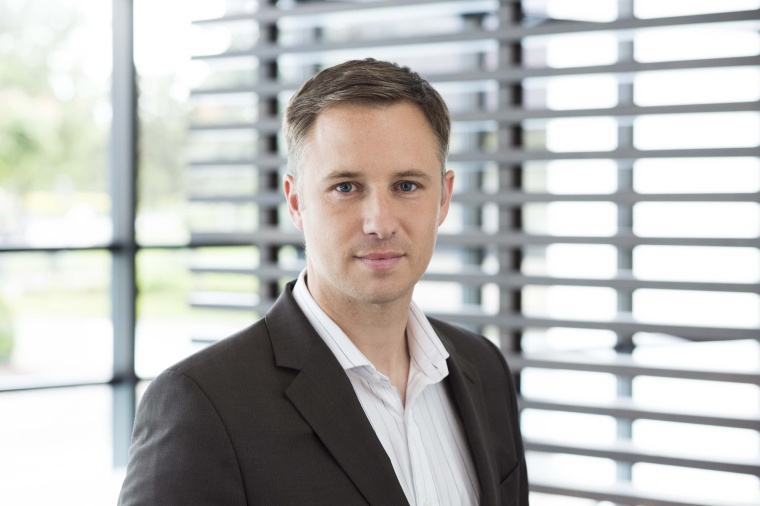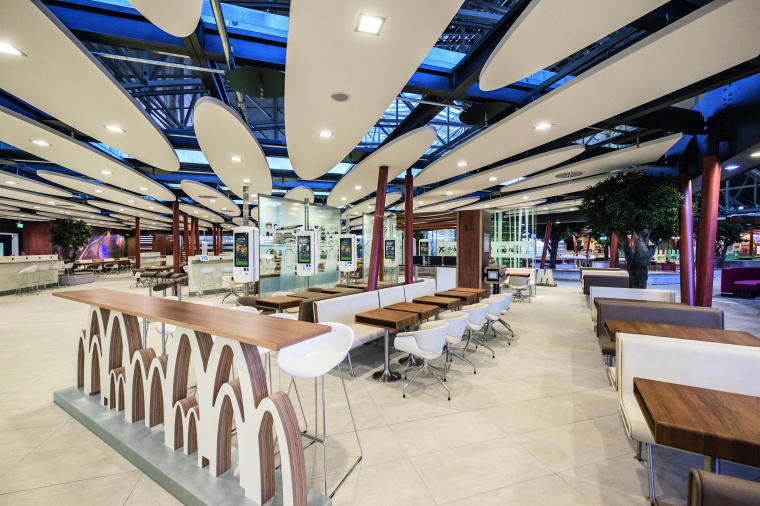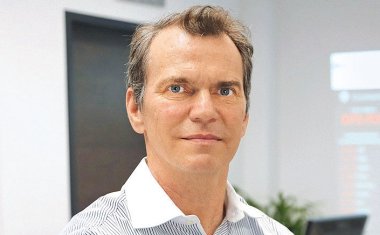"I’m Lovin’ It...": Security Management at McDonald’s


Everybody loves a burger, you might think. And the number of guests that visit McDonald’s every day suggests that is true: after all, there are approximately 1,500 restaurants in Germany where two million customers place their orders every day. What security issues does that generate – and how is security managed? Matthias Erler of GIT SECURITY spoke with Daniel Müller about this. He is Department Head Security at McDonald’s Germany.
Mr. Müller, you head up McDonald’s Security Department. Could you first of all outline how this department fits into the McDonald’s corporate structure, and say for which jobs and which areas you are responsible?
Daniel Müller: The Security Department is part of the National Operations division and is responsible for all aspects of the physical security of almost 1,500 restaurants and various administration buildings in Germany and Luxembourg. The department creates risk analyses, chooses the appropriate organizational and technical risk reduction measures, produces security and training plans, advises the Leadership Team and franchisees in security-relevant matters and maintains contact with security authorities, associations and networks.
Is there also an overall global security department at McDonald’s?
Daniel Müller: In principle, the company security of McDonald’s is decentralized. The company has therefore implemented its own security department in many countries, which looks after the comparable tasks while taking the local security situation and culture into account. This is also the case in Germany. But there is a global security department that provides guidelines on some aspects.
Among other appointments, you were with the German Army – specifically, you were also part of the field intelligence group. What experience that you gained there can you put to good use in your daily work today?
Daniel Müller: The army teaches you to develop many important abilities when dealing with other people (teamwork, the ability to motivate others, strategic thinking …), but also when dealing with challenges, and ultimately how to apply them. These abilities, regardless of whether they are soft skills or ways of thinking, are still of use to me today in my daily work.
Is there something like a McDonald’s security philosophy that forms the basis of your job?
Daniel Müller: It is extremely important for us to be prepared for all possible situations. The department therefore places great emphasis on anticipating potential dangers so that we can implement suitable preventive measures.
Let’s take a look at the ubiquitous subject of Corona: what security-related problems has this caused your company? And what critical decisions and special measures have you taken as a result?
Daniel Müller: McDonald’s serves two million guests in around 1,500 restaurants each day. Just this fact alone creates a broad range of risks. When the government ordered a nationwide lockdown at the beginning of the crisis, we operated our restaurants almost entirely just as a McDrive. This made a significant improvement in the general security situation first of all. The 24/7 stores, however, posed a new problem as they had to be temporarily closed and protected, for example by an intruder alarm. When the measures were relaxed and the restaurants could open again, the security situation returned to normal very quickly. But the checks by our staff to ensure compliance with the social distancing regulations regularly presented them with special difficulties as not every guest was willing to comply. New standard operating procedures (SOPs) were quickly established to be prepared for such situations, and the staff were correspondingly trained by our management.
You formed your own task force for this …?
Daniel Müller: The task force had already been a permanent element of McDonald’s Germany for many years. And an Incident Management reporting system was also integrated a few years ago. This means that every type of incident is reported via the system and subsequently evaluated by readiness teams. If an event then has the potential to develop into a crisis, the task force will be assembled to quickly determine the course of action together with all those involved.
Apart from the Coronavirus and its consequences, what are the currently most important security-related projects that you are dealing with at McDonald’s in Germany?
Daniel Müller: We are currently evaluating various different technical risk reduction measures to ensure that we have the best possible protection. Amongst these are, of course, intruder alarms, emergency call systems, access control and CCTV. We’re also updating all our instructions, SOPs and handbooks to prepare employees for current possible risk situations. We are correspondingly developing new training material and methods that primarily make use of digital media.
What are the typical incidents and how do staff deal with them?
Daniel Müller: The security situation is different in each location. There will inevitably be all sorts of security incidents wherever millions of people from all walks of life come together. Our employees mostly have to deal with antisocial behavior, so they receive training on how to deescalate situations. And in cases where the staff can apply their own solution, they subsequently report the case to the management. But if the situation develops badly, the restaurant management must be involved, and the police will be called if there is a situation that still can’t be brought under control. Those directly involved then make a report to the headquarters.
Have you already had to deal with robberies or even a shooting rampage?
Daniel Müller: Robberies are very rare, and the chances of experiencing a shooting rampage are absolutely minimal. Very few of our restaurants are the victims of robberies. And in the long history of McDonald’s in Germany, there have only ever been two rampage events.
How are your restaurant staff trained?
Daniel Müller: Apart from the compulsory training elements, we also offer them two different one-day seminars. Firstly there are seminars that prepare for the difficult behavior of people in the restaurant – this is primarily concerned with learning de-escalation measures. Secondly, we also offer seminars that explain what is best to do in the event of a rampage or a terrorist attack. These courses are held both in groups and also online. We will be further expanding our range of online courses in future. Apart from training videos that demonstrate the correct behavior in relation to the event in the most memorable way, we are currently developing an educational app that presents security training content in a light-hearted way. The staff can then test how much of the content they have absorbed in a competitive quiz format. And to increase and maintain the motivation, prizes can be won according to the number of points scored.
Do you get a good general idea of the current security situation through the digital tools and the involvement of so many staff? How does that work exactly and how are you able to use it?
Daniel Müller: A precise view of the situation is essential to be able to provide corresponding support. We developed a web application at the end of 2014 together with the Corporate Affairs department and our service provider Smart Data that unifies incident reporting as well as incident and crisis management. The guidelines and the specific knowledge of the affected departments is digitally displayed, and an application has thereby been created that provides added value for the restaurants. The staff can send a report via the telephone hotline or directly via the corresponding web app as soon as an incident occurs. This enables all the relevant departments to be informed in real time and their staff can quickly provide support to the local staff. This tool has been well accepted and the usage and reporting figures are increasing each year. A fundamental factor for this is, of course, the continuous and repeated maintenance of risk awareness within the restaurant management. The reports and the individual steps taken are stored within the tool as incident reports and are then available for later evaluation. This provides the Security Department with an overall picture of the security situation that can be looked at in detail at any time.
What types of security technology do you use (video surveillance, video analysis, fire protection, intruder detection, etc.)?
Daniel Müller: Numerous technical systems are installed in the restaurants. Apart from mechanical solutions that protect against burglary, our restaurants also have fire and intruder detection systems, emergency call systems and CCTV. And, in addition, when we are building a new restaurant or modernizing an older one, we also include CPTED measures that help to make particularly risky locations safer.
And how is your cooperation with the authorities and the police?
Daniel Müller: We maintain close contact with numerous police forces to receive the latest information and to support their investigations. We let our security concepts be regularly checked by the police for their relevance and applicability, in particular if they contain technical risk reduction measures.
You have a mixture of your own restaurants and those belonging to franchisees – does that lead to differences in the security strategies? Do you generally prefer to follow uniform standards?
Daniel Müller: More than 90 % of our restaurants are operated by franchisees as partners of McDonald’s and, as independent businessmen and women, they are fundamentally responsible for setting up their own business practices. There are, however, a number of safety and security standards within the McDonald’s system that are also mandatory for our franchisees.
Which aspects of security will you be looking at in the foreseeable future?
Daniel Müller: Providing the current situation (Corona virus) dies down again, I assume that the security situation will return to normal in and around the restaurants. This will inevitably require some resources. Apart from that, we are continuing to work on a uniform CCTV standard, new training policies und methods, on the educational app and we will be putting out some tenders for security technology.
most read

When the Internet stumbles: Why DNS is important
When DNS fails, the internet stumbles-AWS outage proves resilience and redundancy are vital for digital trust

Integrated and Futureproof: Traka’s Next Chapter
Interview with Stefni Oliver on Traka’s Vision for the Future

Is Your Venue Ready for Martyn’s Law?
Martyn’s Law demands stronger security by 2027. Is your venue prepared to protect and respond?

Assa Abloy's battery-powered Aperio KL100 secures lockers
Boost workplace security and operational flexibility by securing more than just doors.







